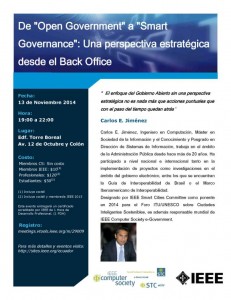Important Dates:
- Full Papers: 31/10/2015
- Tutorial Proposal: 30/11/2015
- Notification: 15/01/2016
- Camera-ready: 27/02/2016
Conference Chair:
- Andreas Meier, University of Fribourg
Program Chair
- Luis Terán, University of Fribourg and Universidad de las Fuerzas Armadas (ESPE)
Tutorial Chair:
- Romel Tintin. Instituto de Altos Estudios Nacionales (IAEN), Ecuador.
Conference Co-Chairs:
- Carlos E. Jiménez, Global Chair. IEEE Computer Society e-Government STC.
- Edy Portman, University of Bern, Switzerland.
- Fernando Daniels, (OUI-COLAM), Montreal, Canada.
- Juan Ponce, FLACSO, Ecuador
- Héctor Rodríguez, Yachay EP, Ecuador
- María Luisa Micó Andrés, University of Alicante (Spain).
- Norberto Lerendegui. Regional Director, IEEE Region 9.
- Paul D. Toasa, AMARUN.
- Jordi Castellà-Roca. Dept. Computer Engineering and Mathematics. Rovira i Virgili University, Catalonia (Spain).
- Roque Moreira, Universidad de las Fuerzas Armadas (ESPE), Ecuador.
- Tomás Villón, Universidad de las Américas, Ecuador.
Local Co-Chairs:
- Christiam Garzón. Universidad de las Américas, Ecuador.
- Lourdes de la Cruz, Universidad de las Fuerzas Armadas (ESPE), Ecuador.
- Marco Galarza. Universidad de las Américas, Ecuador.
- Iria Puyosa, Universidad de las Américas, Ecuador.
|
The challenges of modernizing the state and its administration have increased, especially with regard to the targeted application of Internet technologies. By means of eDemocracy it is intended to support the exchange of knowledge as well as democratic processes. In addition, eGovernment aims to put digital public services at disposal for citizens, companies, and organizations.
The ICEDEG is in its third year of providing a forum for research and technology development in the growing area of eDemocracy & eGovernment. Original, unpublished research paper submissions are solicited from industrial, academic, and other non-profit or public sector researchers reporting on substantial results. Topics of interest include, but are not limited to those listed below.
eGovernment
- Big Data for eGovernment
- Cloud Computing for eGovernment
- Cloud Services for eGovernment
- eAdministration
- eAssistance
- eGovernment Architecture
- eProcurement
- eServices
- eSettlement
- Geographical information systems (GIS)
- Green Government
- Mobile Government
- Mobile Public Services
- Open Government
- Open Data
- Open source solutions for eGovernment
- Public Websites
- Policy Issues
- Security, Privacy and Ethics for eGovernment
- Semantic Web and Ontologies
- Smart Government
eDemocracy
- Electronic identity, identity management
- Electronic signature
- eElection
- eVoting
- Public Key Infrastructure
- Security, Privacy and Ethics
- Social Voting Recommendation Applications
eGovernance
- Business Process Reengineering • Decision Support Systems
- Human Resource Management • IT Governance
- Knowledge Management in Government • New Public Management
- Participatory Governance
- Performance Management
- Public Sector Innovation
- Public Sector Innovation Management
- Public Sector Innovation Transfer
- Transparency in International Aid • Transparency Metrics
- Transparency versus Performance • Transparency versus Privacy
eParticipation
- Collaborative Working Environments • eCollaboration
- eCommunity.
- Expert Systems and Decision Support • Public Memory
- Political Controlling
eSociety
- Collaborative Learning
- Data & Opinion Mining
- eLearning Platforms and MOOCs • eEducation
- Smart Cities
- User acceptance
- User interfaces
- Web-based Learning Communities
eHealth
- Demand and Disease Management • Data Security Issues
- eHealth services
- eMedicine
- eHealth Policy and Practice
- eHealthcare Strategies and Provision • Home Care
- Health Portals
- Mobile Emergency
- Medical Research Ethics
- Patient Privacy and Confidentiality
- Tele-monitoring.
- Wireless telemedicine
|

